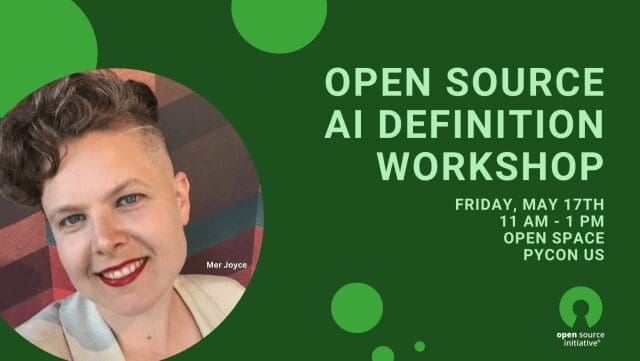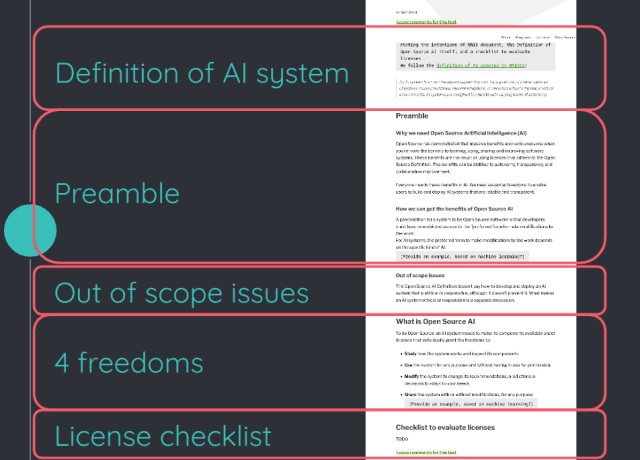Favorite The OSI community is traveling to five continents seeking diverse input on how to guarantee the freedoms to use, study, share and modify Open Source AI systems. SAN FRANCISCO – May 14, 2024 – Open Source Initiative (OSI), globally recognized by individuals, companies and public institutions as the authority
Read More
 Shared by voicesofopensource May 15, 2024
Shared by voicesofopensource May 15, 2024

Favorite Early thoughts on “Apple sample code license”? Apple has released a license to distribute its new model, OpenELM. The license looks BSD/MIT-like with the exclusion of patents. According to you, does it seem OSD compliant? Initial thoughts: @pchestek added that the license appears to be similar to open source
Read More
 Shared by voicesofopensource May 14, 2024
Shared by voicesofopensource May 14, 2024
Favorite There is tension between copyright laws and large datasets suitable to train large language models. Common Corpus is a dataset that only uses text from copyright-expired sources to bypass the legal issues. It’s a useful achievement, paving the path to research without immediate risk of lawsuits. I also fear
Read More
 Shared by voicesofopensource May 7, 2024
Shared by voicesofopensource May 7, 2024
Favorite Definition validation: Seeking volunteers The process has entered a new phase: We are now seeking volunteers to validate the Open Source AI Definition, using it to review existing AI systems. The objective of the phase is to confirm that the Definition works as intended and understand where it fails.
Read More
 Shared by voicesofopensource May 6, 2024
Shared by voicesofopensource May 6, 2024
Favorite The European Commission recently published a public draft of the standards request associated with the Cyber Resilience Act (CRA). Anyone who wants to comment on it has until May 16, after which comments will be considered and a final request to the European Standards Organizations (ESOs) will be issued.
Read More
 Shared by voicesofopensource May 2, 2024
Shared by voicesofopensource May 2, 2024
Favorite New draft of the Open Source AI Definition v.0.0.8 is live! The draft is ready for feedback. The changelog: incorporated feedback from legal review in Gothenburg and 0.0.7 transformed Data transparency to Data information following feedback from the separated the Out of scope section to a FAQ document 18
Read More
 Shared by voicesofopensource April 29, 2024
Shared by voicesofopensource April 29, 2024
Favorite The definition of “open source” in the most recent version (article 2(48)) of the Cyber Resilience Act (CRA) goes beyond the Open Source Definition (OSD) managed by OSI. It says: “Free and open-source software is understood as software the source code of which is openly shared and the license
Read More
 Shared by voicesofopensource April 26, 2024
Shared by voicesofopensource April 26, 2024

Favorite With version 0.0.7 of the Open Source AI Definition just published, we are getting very close to a release candidate version in June, as planned. We’ve covered a lot of ground since FOSDEM 2024, where we presented draft 0.0.4. This month we presented at Open Source Summit North America
Read More
 Shared by voicesofopensource April 23, 2024
Shared by voicesofopensource April 23, 2024
Favorite Comments on the forum A user added in the forum that there is an issue as traditional copyright protection might not apply to weight models because they are essentially mathematical calculations. “ licensing them through any kind of copyright license will not be enforceable !! and this means that
Read More
 Shared by voicesofopensource April 22, 2024
Shared by voicesofopensource April 22, 2024
Favorite Having just exited a very busy week here are the two major milestones to know about. Definition v.0.0.7 is out! Access the definition here and the discussion of it here The changelog: Incorporating the comments to draft v.0.0.6 and results of the working group analysis Removed reference to “the
Read More
 Shared by voicesofopensource April 15, 2024
Shared by voicesofopensource April 15, 2024
Shared by voicesofopensource May 15, 2024


